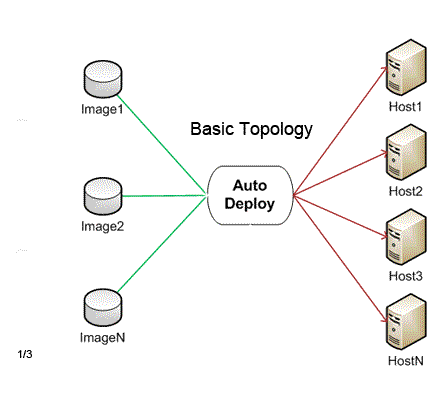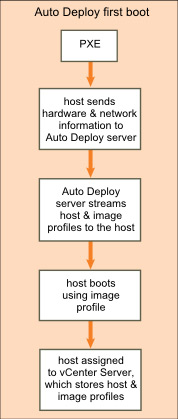1.2b |
vSphere Auto Deploy can provision hundreds of physical hosts with ESXi software. You can specify the image to deploy and the hosts to provision with the image. Optionally, you can specify host profiles to apply to the hosts, and a vCenter Server location (folder or cluster) for each host. Image profiles are created with ESXi Image Builder CLI, and host profiles are created with the vSphere Client.
When you start a physical host set up for Auto Deploy, Auto Deploy uses a PXE boot infrastructure in conjunction with
vSphere host profiles to provision and customize that host. No state is stored on the host itself, instead, the Auto Deploy server
manages state information for each host.
Using the Auto Deploy feature, vCenter Server loads the ESXi image directly into the host memory. Auto Deploy does not store the ESXi
state on the host disk. vCenter Server stores and manages ESXi updates and patching through an image profile, and, optionally, the host
configuration through a host profile.
The first time you install a host with Auto Deploy, the host PXE boots and establishes contact with the Auto Deploy server, which
streams the image profile and any host profile to the host. The host starts, using the image profile, and Auto Deploy assigns the host
to the appropriate vCenter Server system.
When you restart the host, vCenter Server uses the Auto Deploy feature to provision the host with the appropriate image and host profile.
If the image profile changes, for example, for an update or patch, the administrator can propagate the change to all hosts that are
provisioned with Auto Deploy and managed by a vCenter Server system.
Information Type |
Description |
Source of State Information |
Image state |
Executable software to run on an ESXi host. |
Image profile |
Configuration state |
Configurable settings for a host, e.g. virtual switch and driver settings,, boot parameters, etc. |
Host profile |
Dynamic state |
Runtime state generated by running software, e.g. generated private keys or runtime databases. |
Stored in host memory; lost during reboot. |
Virtual machine state |
VMs stored on a host and VM autostart information |
Managed by vCenter Server system by default. |
User input |
State that is based on user input, e.g. IP address provided interactively when system starts up, |
Custom information is stored in an answer file. |
When you turn on a host that you want to provision or reprovision with vSphere Auto Deploy, the Auto Deploy infrastructure supplies the image and, optionally a host profile and a location for that host.
 |
 |
- http://pubs.vmware.com/vsphere-50/index.jsp?topic=/com.vmware.vsphere.install.doc_50/GUID-71F8AE6C-FF4A-419B-93B7-1D318D4CB771.html
- http://www.yellow-bricks.com/2011/08/25/using-vsphere-5-auto-deploy-in-your-home-lab/
1.2b |